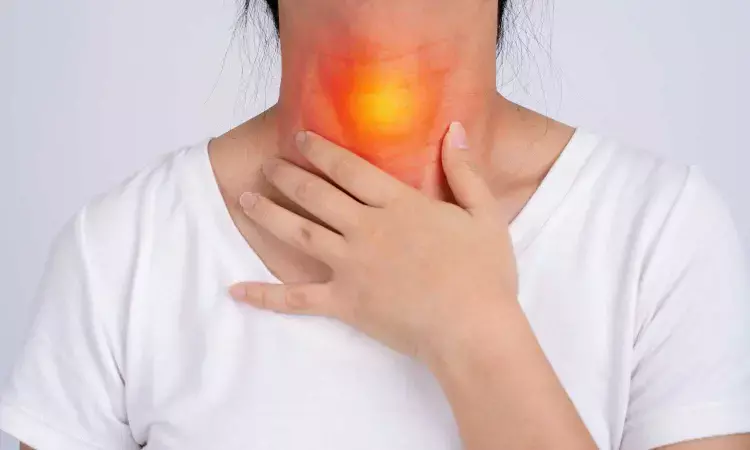- Home
- Medical news & Guidelines
- Anesthesiology
- Cardiology and CTVS
- Critical Care
- Dentistry
- Dermatology
- Diabetes and Endocrinology
- ENT
- Gastroenterology
- Medicine
- Nephrology
- Neurology
- Obstretics-Gynaecology
- Oncology
- Ophthalmology
- Orthopaedics
- Pediatrics-Neonatology
- Psychiatry
- Pulmonology
- Radiology
- Surgery
- Urology
- Laboratory Medicine
- Diet
- Nursing
- Paramedical
- Physiotherapy
- Health news
- Fact Check
- Bone Health Fact Check
- Brain Health Fact Check
- Cancer Related Fact Check
- Child Care Fact Check
- Dental and oral health fact check
- Diabetes and metabolic health fact check
- Diet and Nutrition Fact Check
- Eye and ENT Care Fact Check
- Fitness fact check
- Gut health fact check
- Heart health fact check
- Kidney health fact check
- Medical education fact check
- Men's health fact check
- Respiratory fact check
- Skin and hair care fact check
- Vaccine and Immunization fact check
- Women's health fact check
- AYUSH
- State News
- Andaman and Nicobar Islands
- Andhra Pradesh
- Arunachal Pradesh
- Assam
- Bihar
- Chandigarh
- Chattisgarh
- Dadra and Nagar Haveli
- Daman and Diu
- Delhi
- Goa
- Gujarat
- Haryana
- Himachal Pradesh
- Jammu & Kashmir
- Jharkhand
- Karnataka
- Kerala
- Ladakh
- Lakshadweep
- Madhya Pradesh
- Maharashtra
- Manipur
- Meghalaya
- Mizoram
- Nagaland
- Odisha
- Puducherry
- Punjab
- Rajasthan
- Sikkim
- Tamil Nadu
- Telangana
- Tripura
- Uttar Pradesh
- Uttrakhand
- West Bengal
- Medical Education
- Industry
Reduced Thyroid Hormone Sensitivity Linked to Higher Thyroid Cancer Risk in Euthyroid Patients: Study Finds

China: A recent study conducted by researchers from the School of Medicine at Nankai University, Tianjin, China, highlights a potential new risk factor for differentiated thyroid cancer (DTC) among individuals with normal thyroid hormone levels. The study, published in Frontiers in Endocrinology, suggests that decreased sensitivity to thyroid hormones, both centrally and peripherally, may play a critical role in the development of DTC and could be valuable in refining preoperative cancer risk assessments.
The research team, led by Huaijin Xu, retrospectively analyzed data from 9,515 euthyroid adults who underwent thyroidectomy for nodular thyroid disease. All participants had normal thyroid hormone levels before surgery, and their nodules were confirmed as either benign or DTC postoperatively.
To better understand the hormonal dynamics, the researchers examined several composite indicators of thyroid hormone sensitivity, including the thyroid-stimulating hormone index (TSHI), thyrotroph thyroxine resistance index (TT4RI), the ratio of free triiodothyronine to free thyroxine (FT3/FT4), and the thyroid’s secretory capacity (SPINA-GT). These indices reflect how the body responds to and regulates thyroid hormones.
The study led to the following findings:
- Individuals with higher TSHI and TT4RI, reflecting reduced central thyroid hormone sensitivity, had significantly increased odds of being diagnosed with differentiated thyroid cancer (DTC).
- Each unit increase in TSHI and TT4RI was linked to a 34% and 35% higher risk of DTC, respectively.
- Lower FT3/FT4 ratios and SPINA-GT values, indicating reduced peripheral sensitivity and secretory capacity, were also associated with greater cancer risk.
- These associations remained consistent across subgroups defined by age, sex, metabolic status, thyroid autoimmunity, and nodule size.
- The relationship between thyroid hormone sensitivity and DTC risk was non-linear, pointing to a more intricate physiological mechanism.
- TSHI and TT4RI showed stronger associations with thyroid malignancy than traditional markers like TSH.
- No single thyroid parameter demonstrated both high sensitivity and specificity in differentiating malignant from benign nodules.
- The findings highlight the potential value of using combined thyroid hormone sensitivity indices in more comprehensive diagnostic models.
The researchers emphasize that their findings shed new light on the pathophysiology of thyroid cancer in patients with euthyroid profiles. They propose that thyroid hormone sensitivity indices could serve as supplementary tools in preoperative evaluation and guide clinical decisions regarding the likelihood of malignancy in thyroid nodules.
“Recognizing the role of thyroid hormone sensitivity may enhance our understanding of thyroid cancer development and aid in building more accurate predictive models,” the authors noted.
"The study opens the door for future research to explore how modulating hormone sensitivity could influence thyroid cancer outcomes and whether these indices can be incorporated into clinical guidelines for managing thyroid nodules," they concluded.
Reference:
Xu, H., Liu, H., Hu, X., Jia, X., Xue, Z., Wang, A., Kang, S., & Lyu, Z. (2025). Reduced sensitivity to thyroid hormones is associated with differentiated thyroid cancer in the euthyroid thyroidectomy population. Frontiers in Endocrinology, 16, 1595002. https://doi.org/10.3389/fendo.2025.1595002
Dr Kamal Kant Kohli-MBBS, DTCD- a chest specialist with more than 30 years of practice and a flair for writing clinical articles, Dr Kamal Kant Kohli joined Medical Dialogues as a Chief Editor of Medical News. Besides writing articles, as an editor, he proofreads and verifies all the medical content published on Medical Dialogues including those coming from journals, studies,medical conferences,guidelines etc. Email: drkohli@medicaldialogues.in. Contact no. 011-43720751


